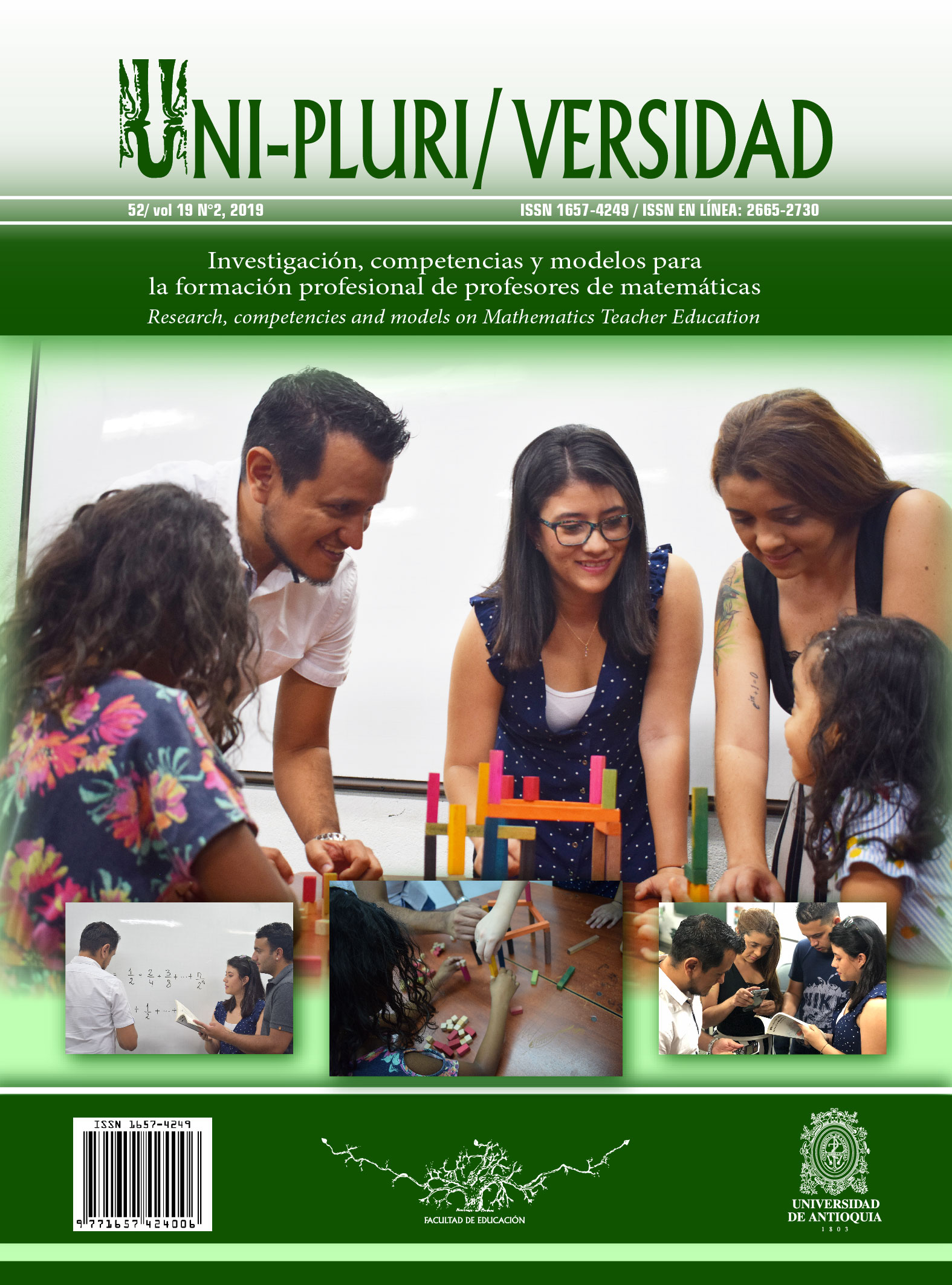Mathematics Teachers: research on the knowledge, competencies, and models for their professional Learning
DOI:
https://doi.org/10.17533/udea.unipluri.19.2.01Keywords:
teacher training, professional learning, professional developmentAbstract
Teacher training can be considered as a key aspect in development and quality of educational processes. Also, it can be considered an area/field of research where developments in educational research and academic disciplines come together. During the last two decades, research on the learning of mathematics teachers has had a significant development. It includes delimitation of theoretical constructs, approaches and programs for professional development, models to describe teacher knowledge, beliefs, competencies and recently, studies that focus on programs for teacher training and on training as teacher trainer. This editorial offers an introduction to the journal Uni-pluriversidad, volume 19th, no 2, dedicated to research on professional learning of mathematics teachers.
Downloads
References
Alencar, E. S. 2014. Contribuições de pesquisas brasileiras para a didática nos anos iniciais. Linguagem, Educação e Sociedade (UFPI), 31, 149-169. https://revistas.ufpi.br/index.php/lingedusoc/article/view/8662
Alsina, Á. (2019). Hacia una formación transformadora de futuros maestros de matemáticas: avances de investigación desde el modelo Realista-Reflexivo. Uni-pluriversidad, 19(2), 60-79. https://doi.org/10.17533/udea.unipluri.19.2.05
Bernabeu, M., Moreno, M., y Llinares, S. (2019). Experimento de enseñanza como una aproximación metodológica a la investigación en Educación Matemática. Uni-pluriversidad, 19(2), 103-123. https://doi.org/10.17533/udea.unipluri.19.2.07
Fiorentini, D.; Passos, C. L. B. y Lima, R. C. R. (Eds) (2016) Mapeamento da pesquisa acadêmica brasileira sobre o professor que ensina matemática: período 2001 – 2012. Campinas SP: FE/UNICAMP.
Gatti, B. (2010). Formação de professores no brasil: características e problemas. Educ. Soc. , Campinas, 31(113), 1355-1379
Goldsmith, L. T., Doerr, H. M., y Lewis, C. C. (2014). Mathematics teachers’ learning: a conceptual framework and synthesis of research. Journal of Mathematics Teacher Education, 17(1), 5–36. https://doi.org/10.1007/s10857-013-9245-4
Guacaneme-Suárez, E. A., Obando-Zapata, G., Garzón, D., y Villa-Ochoa, J. A. (2017). Colombia: Mathematics Education and the Preparation of Teachers. Consolidating a Professional and Scientific Field. In A. Ruiz (Ed.), Mathematics Teacher Preparation in Central America and the Caribbean (pp. 19–37). Switzerland: Springer International Publishing. https://doi.org/10.1007/978-3-319-44177-1_2
Larrain, M., y Kaiser, G. (2019). Analysis of Students’ Mathematical Errors as a Means to Promote Future Primary School Teachers’ Diagnostic Competence. Uni-pluriversidad, 19(2), 17-39. https://doi.org/10.17533/udea.unipluri.19.2.02
Lin, F.-L., y Rowland, T. (2016). Pre-Service and In-Service Mathematics Teachers’ Knowledge and Professional Development. In Á. Gutiérrez, G. C. Leder, y P. Boero (Eds.), The Second Handbook of Research on the Psychology of Mathematics Education (pp. 483–520). Rotterdam: Sense Publishers. https://doi.org/10.1007/978-94-6300-561-6_14
López Dávila, C. (2016). Un modelo de investigación orientado a la implementación de programas estructurados en ambientes virtuales de aprendizaje. Uni-pluriversidad, 15(2), 61-73. http://aprendeenlinea.udea.edu.co/revistas/index.php/unip/article/view/26823
Rosa, M., & Orey, D. C. (2019). Mathematical modelling as a virtual learning environment for teacher education programs. Uni-pluriversidad, 19(2), 80-102. https://doi.org/10.17533/udea.unipluri.19.2.04
Romo-Vázquez, A., Barquero, B., & Bosch, M. (2019). El desarrollo profesional online de profesores de matemáticas en activo: una unidad de aprendizaje sobre la enseñanza de la modelización matemática. Uni-pluriversidad, 19(2), 161-183.
doi:https://doi.org/10.17533/udea.unipluri.19.2.09
Sánchez-Barbero, B., Calatayud, M., y Chamoso, J. M. (2019). Análisis de la interacción de maestros cuando resuelven problemas realistas conjuntamente con sus alumnos en aulas de primaria, teniendo en cuenta su experiencia docente. Uni-pluriversidad, 19(2), 40-59.
https://doi.org/10.17533/udea.unipluri.19.2.03
Salazar, J. V. F. y Carrillo, F. I. (2019). Espacio de Trabajo Matemático Personal de profesores en relación a la función definida por tramos. Uni-pluriversidad, 19(2), 144-160.
https://doi.org/10.17533/udea.unipluri.19.2.08
Velasco, C., & Gómez, P. (2019). Calidad y dificultad de los cuestionarios de un MOOC. Uni-pluriversidad, 19(2), 124-143.
Published
How to Cite
Issue
Section
License
Authors who have publications in this Journal accept the following terms:
- The content of each article is the responsibility of its authors
- The author(s) preserve(s) the moral rights over the article and transfer(s) the patrimonial rights to the University of Antioquia, which can publish it or distribute electronic copies, as well as include it in indexing services, directories or national and international Open Access data bases, under the Creative Commons Attribution License (CC BY-NC-ND).
- The author(s) should sign a declaration of transfer of economic rights to the University of Antioquia, after the acceptance of the manuscript.
- Authors are allowed and advised to disseminate their work through the Internet (eg, institutional telematic archives or their website) before and during the submission process. That can produce interesting exchanges and increase citations of the published work.
- The author(s) has (have) the responsibility to arrange and get the necessary permissions to reproduce any material protected by copyright.











